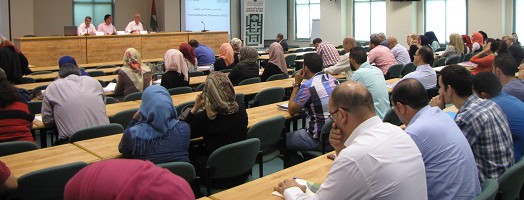The Constitutional Framework of the Palestine Liberation Organisation
Birzeit - Monday, 14 September 2015: In the context of the Birzeit Legal Encounters programme, the Institute of Law (IoL) organised a legal encounter on The Constitutional Framework of the Palestine Liberation Organisation. The event brought together members of the legal community, academics,
and representatives of civil society organisations and government bodies. A number of law students at Birzeit University also attended the legal encounter.
Having welcomed the speakers and audience, Dr. Ghassan Faramand, IoL Director, highlighted significance and discussion of the constitutional framework of the Palestine Liberation Organisation (PLO). This legal encounter is held in the context of calls to convene the Palestinian National Council (PNC) and introduce changes within the PLO Executive Committee. Dr. Faramand raised several key questions to be tackled by speakers in the legal encounter.
Mr. Mu’een Barghouthi, academic researcher at the IoL, stated that the PLO constitutional system has not been raised for discussion for an extended period of time. According to Barghouthi, a duplicate constitutional system is a significant challenge to the Palestinian legal system. PLO primary legislation serves as constitutional instruments of the Organisation. From a constitutional perspective, In the context of legislative, political and financial functions, Barghouthi analysed many aspects of the PLO, particularly the working relationships between the PLO constitutional bodies (PNC and Executive Committee) and institutions of the Palestinian National Authority (PNA). Barghouthi also stressed the important issue of evolution of the PLO legislation. This is not instantaneous, but dates back to 1964 when the PLO was established and PNC convened. Finally, Barghouthi elaborated on key requirements to correctly understand the Palestinian constitutional system. To ensure greater transparency, Barghouthi recommended that PLO regulations be publicly disseminated. The PNC should be revitalised by means of direct, national public elections. To promote integrated, rather than duplicate roles, steps need to be taken to reinvigorate the PLO institutions. Structural and constitutional relationships between the PLC and PNA should also be reviewed.
Mr. Jihad Harb addressed key challenges “the PLO currently faces, including PNC elections and representation of the Palestinian people.” Harb called for the election of new PNC members. According to Article 8 of the PLO Bylaw, PNC members are appointed through a direct election. Harb went over advantages and disadvantages of current calls for an emergency session of the PNC. According to Harb, these are designed to “refurbish” the PLO. With respect to representation of the Palestinian people on the PNC and PLO Executive Committee, Harb presented a set of variables, including considerations of age and demographic distribution. The average age of members on the PLO Executive Committee is 74 years. Against this background, Harb emphasised that the youth need to be involved in the PLO bodies. The youth comprise a majority of the Palestinian people.
In the ensuing discussion, the audience raised several questions. These focused on legal challenges caused by duplicity of the Palestinian legal system, including laws and regulations of both the PLO and the PNA.











